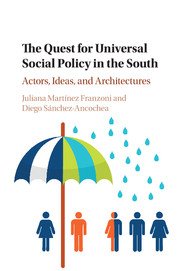Book contents
- Frontmatter
- Contents
- List of Figures
- List of Tables
- Acknowledgements
- List of Abbreviations
- Part I Universalism in the South
- Part II A Comparative Study of Policy Architectures
- 3 Policy Architectures and Universal Outputs Today
- 4 The Long-Term Influence of Policy Architectures
- Part III Building Universalism in Costa Rica
- Part IV Conclusions
- References
- Index
4 - The Long-Term Influence of Policy Architectures
from Part II - A Comparative Study of Policy Architectures
Published online by Cambridge University Press: 10 November 2016
- Frontmatter
- Contents
- List of Figures
- List of Tables
- Acknowledgements
- List of Abbreviations
- Part I Universalism in the South
- Part II A Comparative Study of Policy Architectures
- 3 Policy Architectures and Universal Outputs Today
- 4 The Long-Term Influence of Policy Architectures
- Part III Building Universalism in Costa Rica
- Part IV Conclusions
- References
- Index
Summary
Introduction
Policy architectures do not only explain the degree of universalism in the short term (as discussed in the previous chapter), but also influence the trajectory of policies over the long run. If social programs exclusively incorporate the better off, pressures to reach out to lower-income groups will be weak. If policies depart from the poor alone, transfers will be low and services will not have sufficient quality to attract wealthier groups. If provision of services is exclusively private, preventing fragmentation and delivering standardized benefits for the whole society is unlikely.
To consider the dynamic role of policy architectures, we introduce the concept of foundational architectures: the blueprint of policy instruments set up by states in an initial effort to organize social benefits. The timing of foundational architectures varies across countries and its identification is more or less straightforward depending on national circumstances. For instance, determining the foundational architecture is relatively easy in Costa Rica: formal state arrangements for health care provision emerged with the creation of the social insurance agency in 1941. Defining the foundational architecture of old-age transfers in Uruguay is much harder due to the blurred boundaries between public and private sectors since inception.
We identify two distinct dynamic roles of policy architectures: first, to empower some actors and create financial and political incentives for subsequent reforms; and second, to constrain the number of possible alternatives that social and state actors can pursue. Our point is not that policy architectures are the sole determinants of universal outputs – democracy and partisan ideology are obviously important – but that they influence the likelihood and speed of pro-universal reforms.
We develop this argument by describing the foundational architectures and their evolution over time in health care and pensions in Costa Rica, Mauritius, South Korea, and Uruguay. We show that in democratic contexts there were advances as well as set-backs. For example, Costa Rica and Uruguay had electoral competition for most of the first two-thirds of the twentieth century (see Chapter 1), yet social policies in the former resulted in more universal outputs than in the latter. In Mauritius, electoral competition and the presence of left-wing coalitions favored the expansion of health and non-contributory pensions during the second half of the twentieth century. However, the same democratic institutions did little to curb the outside option, which from the onset undermined unified benefits.
- Type
- Chapter
- Information
- The Quest for Universal Social Policy in the SouthActors, Ideas and Architectures, pp. 70 - 104Publisher: Cambridge University PressPrint publication year: 2016



